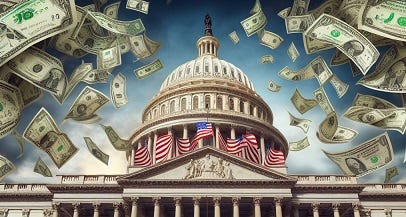U.S. Investment Policy Reforms: Shaping the Future of Business

January 30, 2025
Investment policy reforms play a crucial role in shaping the future of the U.S. economy by affecting business decisions, market stability, and the overall investment environment. As the global economy evolves, so do the regulations that govern investment practices in the U.S. These reforms can provide opportunities for growth, introduce new risks, and redefine the landscape of financial markets. In this article, we’ll explore the key investment policy reforms in the U.S. economy and their implications for businesses and investors.
1. Tax Reforms and Investment IncentivesTax policy is one of the most significant tools used by the U.S. government to encourage investment and business growth. Key tax reforms have a direct impact on corporate profitability, investment behavior, and overall economic growth.
Corporate Tax Cuts and Tax IncentivesThe U.S. government has enacted several tax reforms to encourage business investment.
Capital gains tax rates have a significant influence on investor behavior, particularly for individuals investing in stocks, bonds, and real estate. The TCJA also reduced the capital gains tax rate for many taxpayers, creating an environment conducive to investment in equities, real estate, and other high-growth assets.
2. Regulatory Reforms and Financial OversightFinancial market regulations are essential for ensuring market stability, protecting investors, and preventing systemic risks. Several reforms have been implemented to address weaknesses exposed during the financial crisis, as well as to modernize the financial system.
Dodd-Frank Wall Street Reform and Consumer Protection ActAfter the financial crisis, the U.S. government passed the Dodd-Frank Act to regulate financial institutions and reduce the risk of another crisis. Key provisions include:
The Trump administration rolled back some of the Dodd-Frank regulations, arguing that these restrictions were too burdensome for small businesses and banks. The rollback provided more flexibility for financial institutions but also raised concerns about consumer protection and market stability.
3. Trade Policy Reforms and Global InvestmentU.S. trade policy has a profound impact on investment opportunities and business strategies, especially for industries that rely on international markets. Trade reforms, including tariffs and trade agreements, influence global investment flows and affect businesses’ access to resources and customers.
The U.S.-Mexico-Canada Agreement (USMCA)Replacing the North American Free Trade Agreement (NAFTA), the USMCA is designed to boost trade among the U.S., Canada, and Mexico while providing new protections for intellectual property and reducing barriers to U.S. agricultural exports.
The U.S.-China trade conflict introduced a series of tariffs on Chinese goods, leading to shifts in global supply chains and investment patterns. Some industries, such as technology and manufacturing, faced increased costs, while others, such as agriculture, benefited from new market opportunities in other regions.
The Trump administration pursued a series of bilateral trade deals, aimed at securing better terms for U.S. businesses. While these agreements have created new investment opportunities, they have also introduced uncertainty for businesses reliant on global trade partnerships.
4. Environmental and Sustainability Policy ReformsSustainability is increasingly a focus for both the public and private sectors, and U.S. policies are evolving to encourage green investments and sustainable business practices. The rise of environmental, social, and governance (ESG) investing is reshaping the business landscape.
Green Energy and Climate Change InitiativesGovernment incentives and subsidies for clean energy, including solar, wind, and electric vehicles, are driving investments in green technologies.
Although the U.S. formally withdrew from the Paris Climate Agreement under the Trump administration, the Biden administration rejoined in 2021, signaling a renewed commitment to climate action.
Financial market reforms focus on ensuring businesses have access to capital while protecting investors and maintaining market stability. These reforms facilitate a more transparent and accessible capital markets environment.
The Jumpstart Our Business Startups (JOBS) ActThe JOBS Act, passed in 2012, made it easier for small businesses and startups to access capital through crowdfunding, public offerings, and other mechanisms.
The SEC has made reforms to securities laws that facilitate easier access to public markets for emerging businesses, including updates to the rules surrounding initial public offerings (IPOs) and private investments. These changes allow more businesses to raise capital, accelerating growth and innovation.
6. How Businesses Can Leverage These ReformsBusinesses can take advantage of these key reforms by:

U.S. Investment Policies: Key Trends and Effects on Markets
Explore how U.S. investment policies shape financial markets, economic growth, and business strategies, offering both opportunities and challenges for investors

U.S. Investment Policies and Their Role in Business Development
Explore how U.S. investment policies influence business growth, offering opportunities and challenges for industries. Understand the key regulations and strategies driving economic expansion

U.S. Investment Policy Reforms: Shaping the Future of Business
Explore the key investment policy reforms in the U.S. economy that are reshaping business strategies, influencing markets, and creating new opportunities for investors

A Comprehensive Look at U.S. Investment Policy Shifts in 2025
In 2025, U.S. investment policies have undergone significant transformations. Discover how these reforms are impacting industries, investment strategies, and economic growth

Analyzing the Impact of U.S. Investment Policies on Investment Strategies
Explore how evolving U.S. investment policies create new opportunities and risks for investors. Learn how changes in tax, trade, and financial regulations affect investment strategies

A Look Ahead: U.S. Investment Policies and Financial Market Trends
As the U.S. economy evolves, so do its investment policies and financial markets. Discover what the future holds for investors as we explore trends, innovations, and challenges in U.S. investment strategies

A Guide to Understanding U.S. Investment Policies for Business Growth
Explore how U.S. investment policies impact business success. Learn how to navigate key regulations, tax incentives, and funding opportunities to maximize growth potential

How U.S. Government Policies Influence Investment Approaches
The U.S. government plays a key role in shaping investment strategies through regulatory frameworks, fiscal policies, and incentives. Explore how these factors impact business decisions and investment trends

U.S. Investment Policies and Global Impact
U.S. investment policies are reshaping global markets, influencing trade, foreign investments, and economic stability. This article explores the implications for international businesses and investors
The Atlantic Daily
Get our guide to the day’s biggest news and ideas, delivered to your inbox every weekday and Sunday mornings. See more newsletters
.webp)
Ideas That Matter
Subscribe and support more than 160 years of independent journalism.
Subscribe